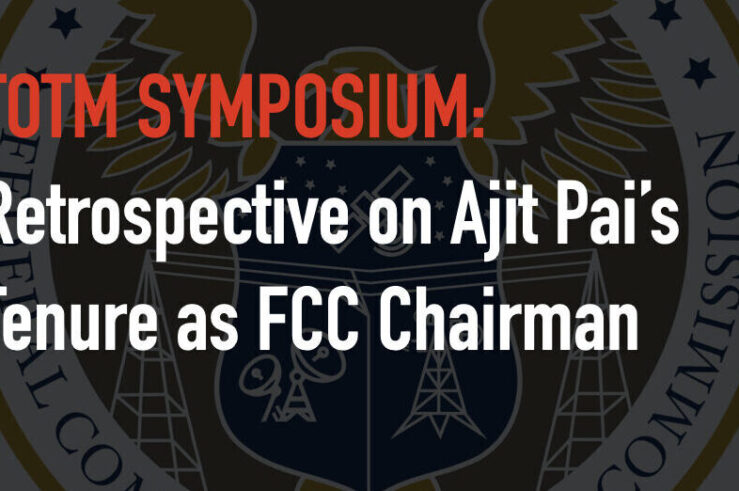Chairman Pai’s FCC Followed a Sound Process in Approving L-Band Wireless Services
During Chairman Ajit Pai’s tenure, the Federal Communications Commission adopted key reforms that improved the agency’s processes. No less important than process reform is process integrity. The commission’s L-Band Order and the process that produced it will be the focus here. In that proceeding, Chairman Pai led a careful and deliberative process that resulted in ... Chairman Pai’s FCC Followed a Sound Process in Approving L-Band Wireless Services
How Chairman Pai Restored the FCC’s Independence
Chairman Ajit Pai will be remembered as one of the most consequential Federal Communications Commission chairmen in history. His policy accomplishments are numerous, including the repeal of Title II regulation of the internet, rural broadband development, increased spectrum for 5G, decreasing waste in universal service funding, and better controlling robocalls. Less will be said about ... How Chairman Pai Restored the FCC’s Independence
The (Conventional) 5G Chairman
Chairman Ajit Pai prioritized making new spectrum available for 5G. To his credit, he succeeded. Over the course of four years, Chairman Pai made available more high-band and mid-band spectrum, for licensed use and unlicensed use, than any other Federal Communications Commission chairman. He did so in the face of unprecedented opposition from other federal ... The (Conventional) 5G Chairman
Why Restoring Internet Freedom Was a Landmark Accomplishment
I am pleased to participate in this retrospective symposium regarding Ajit Pai’s tenure as Federal Communications Commission chairman. I have been closely involved in communications law and policy for nearly 45 years, and, as I’ve said several times since Chairman Pai announced his departure, he will leave as one of the most consequential leaders in ... Why Restoring Internet Freedom Was a Landmark Accomplishment
Great Job, Kid! (And Welcome to the Private Sector)
Many thanks to Geoffrey Manne for this opportunity to memorialize a few thoughts I have about Ajit’s service on the Federal Communications Commission. My remarks will be more about Ajit as a person rather than the substance and long laundry list of his accomplishments as chair. Others will do that, I’m sure. The first memory ... Great Job, Kid! (And Welcome to the Private Sector)
Introductory Post: Retrospective on Ajit Pai’s Tenure as FCC Chairman
Ajit Pai will step down from his position as chairman of the Federal Communications Commission (FCC) effective Jan. 20. Beginning Jan. 15, Truth on the Market will host a symposium exploring Pai’s tenure, with contributions from a range of scholars and practitioners. As we ponder the changes to FCC policy that may arise with the ... Introductory Post: Retrospective on Ajit Pai’s Tenure as FCC Chairman
The DOJ’s Antitrust Case Against Google: A Tough Slog, but Maybe an Intriguing Possibility?
The U.S. Department of Justice’s (DOJ) antitrust case against Google, which was filed in October 2020, will be a tough slog.[1] It is an alleged monopolization (Sherman Act, Sec. 2) case; and monopolization cases are always a tough slog. In this brief essay I will lay out some of the issues in the case and raise ... The DOJ’s Antitrust Case Against Google: A Tough Slog, but Maybe an Intriguing Possibility?
Trade Promotions in High Tech
As one of the few economic theorists in this symposium, I believe my comparative advantage is in that: economic theory. In this post, I want to remind people of the basic economic theories that we have at our disposal, “off the shelf,” to make sense of the U.S. Department of Justice’s lawsuit against Google. I ... Trade Promotions in High Tech
Why the Federal Government’s Antitrust Case Against Google Should—and Likely Will—Fail
On October 20, 2020, the U.S. Department of Justice (DOJ) and eleven states with Republican attorneys general sued Google for monopolizing and attempting to monopolize the markets for general internet search services, search advertising, and “general search text” advertising (i.e., ads that resemble search results). Last week, California joined the lawsuit, making it a bipartisan ... Why the Federal Government’s Antitrust Case Against Google Should—and Likely Will—Fail
The Case Against Google Advertising: What’s the Relevant Market and How Many Are There?
U.S. antitrust regulators have a history of narrowly defining relevant markets—often to the point of absurdity—in order to create market power out of thin air. The Federal Trade Commission (FTC) famously declared that Whole Foods and Wild Oats operated in the “premium natural and organic supermarkets market”—a narrowly defined market designed to exclude other supermarkets ... The Case Against Google Advertising: What’s the Relevant Market and How Many Are There?
The Antitrust Prohibition of Favoritism, or the Imposition of Corporate Selflessness
It is my endeavor to scrutinize the questionable assessment articulated against default settings in the U.S. Justice Department’s lawsuit against Google. Default, I will argue, is no antitrust fault. Default in the Google case drastically differs from default referred to in the Microsoft case. In Part I, I argue the comparison is odious. Furthermore, in ... The Antitrust Prohibition of Favoritism, or the Imposition of Corporate Selflessness
Google and Shifting Conceptions of What It Means to Improve a Product
Judges sometimes claim that they do not pick winners when they decide antitrust cases. Nothing could be further from the truth. Competitive conduct by its nature harms competitors, and so if antitrust were merely to prohibit harm to competitors, antitrust would then destroy what it is meant to promote. What antitrust prohibits, therefore, is not ... Google and Shifting Conceptions of What It Means to Improve a Product






